Massachusetts Rental Agreement

A Massachusetts rental agreement is a legal contract between a landlord overseeing a rental property and a tenant who wishes to use it. Massachusetts landlord-tenant law governs these agreements; rental terms must be within the limits allowed by law.
Massachusetts Rental Agreement Types
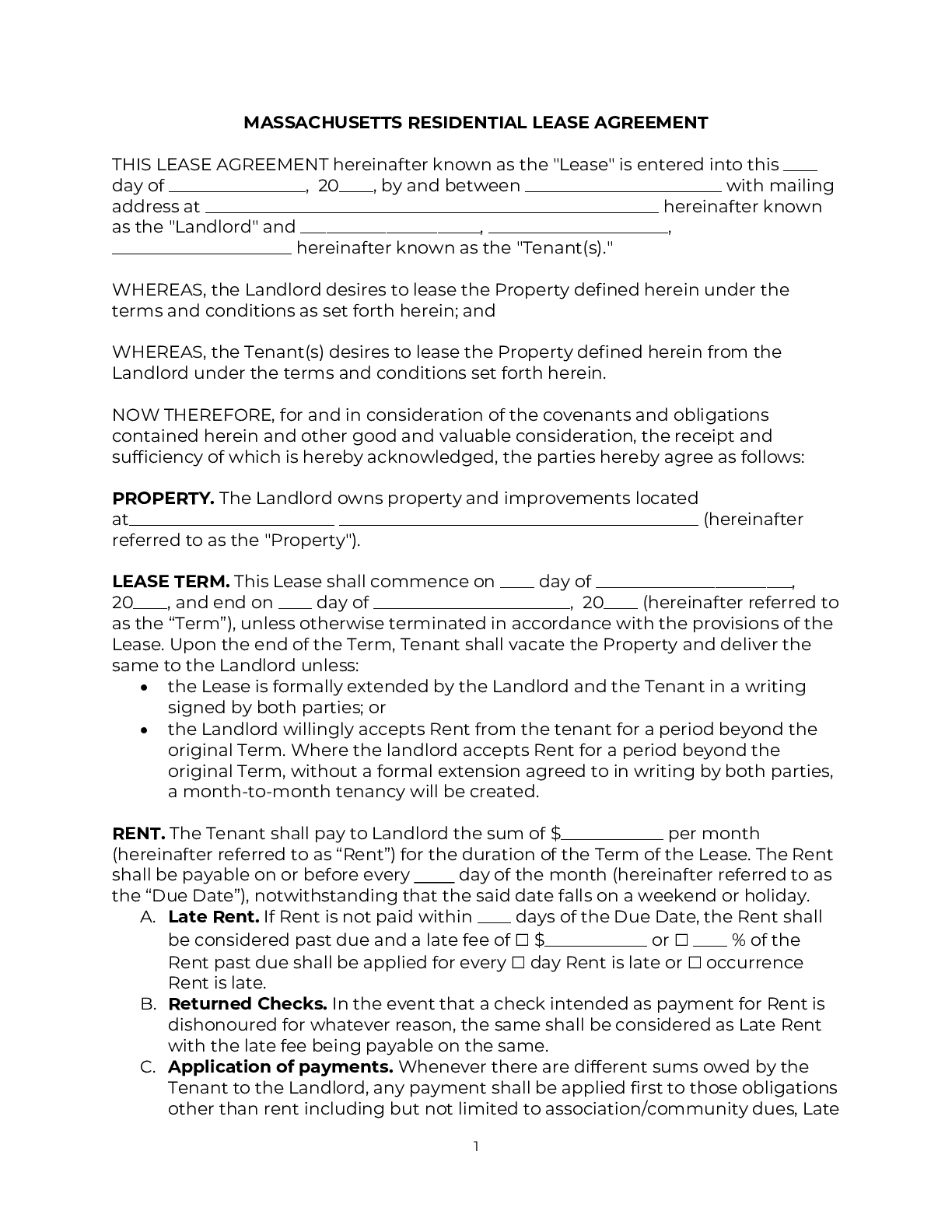
A Massachusetts residential lease agreement (“rental agreement”) is a legal contract for a tenant to rent a residential property from a landlord, subject to terms and conditions agreed by all parties.

A Massachusetts month-to-month lease agreement is a contract (not necessarily written) where a tenant rents property from a landlord. The full rental term is one month, renewable on a month-to-month basis.
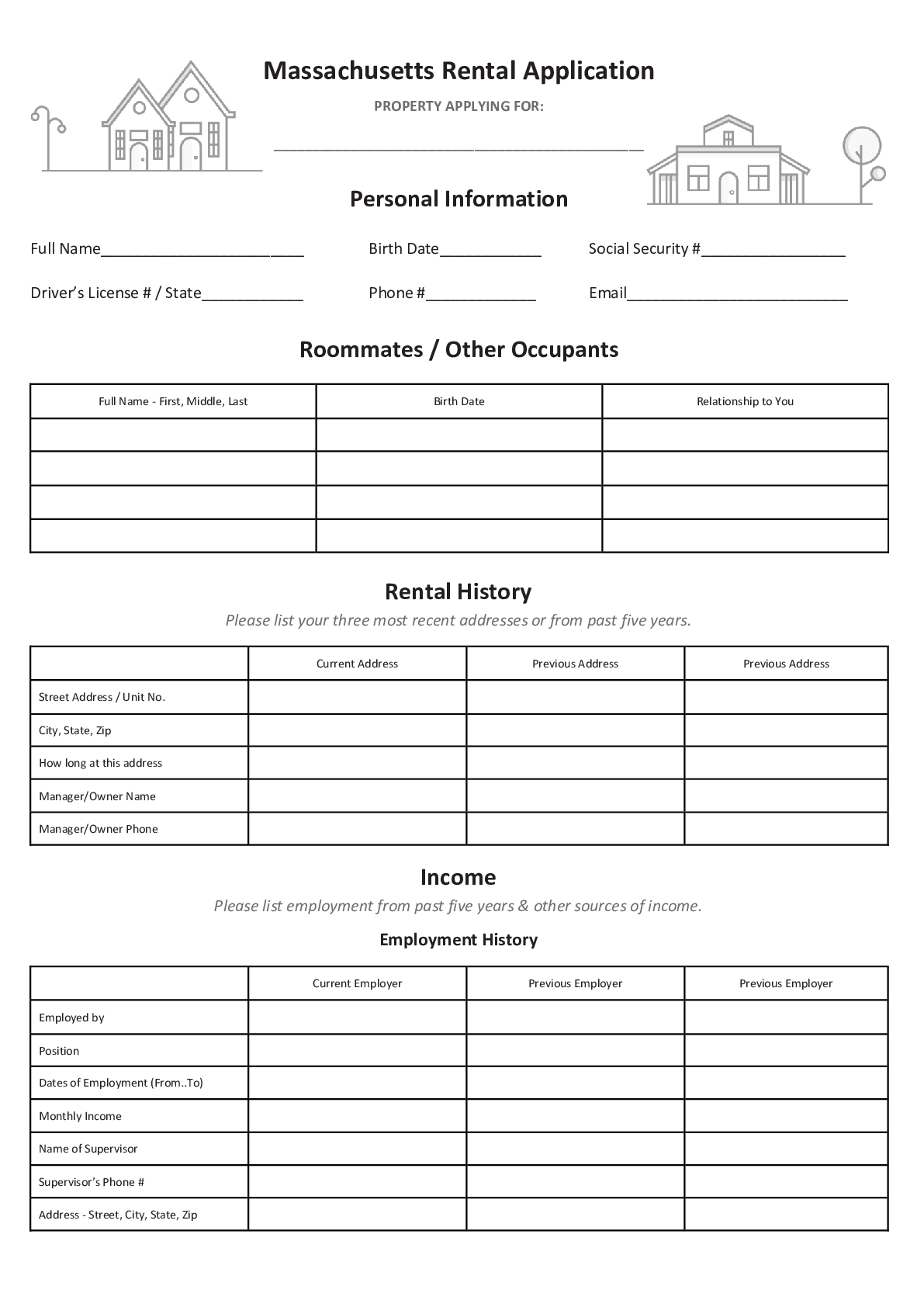
Massachusetts landlords may use a rental application form to screen prospective tenants. A rental application collects information relating to finances, rental history, and past evictions.
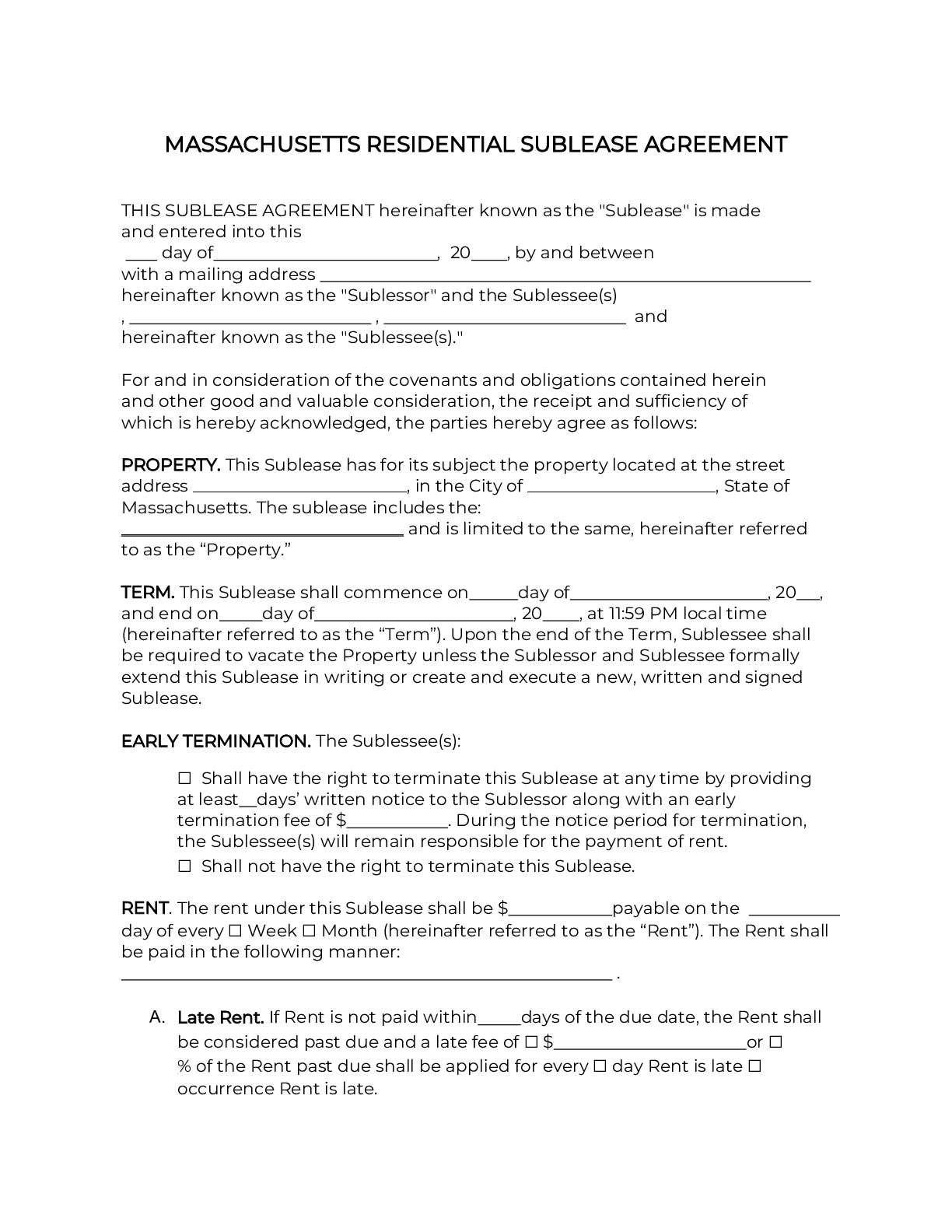
A Massachusetts sublease agreement is a legal contract where a tenant ("sublessor") rents (“subleases”) property to a new tenant (“sublessee”), usually with the landlord’s permission.
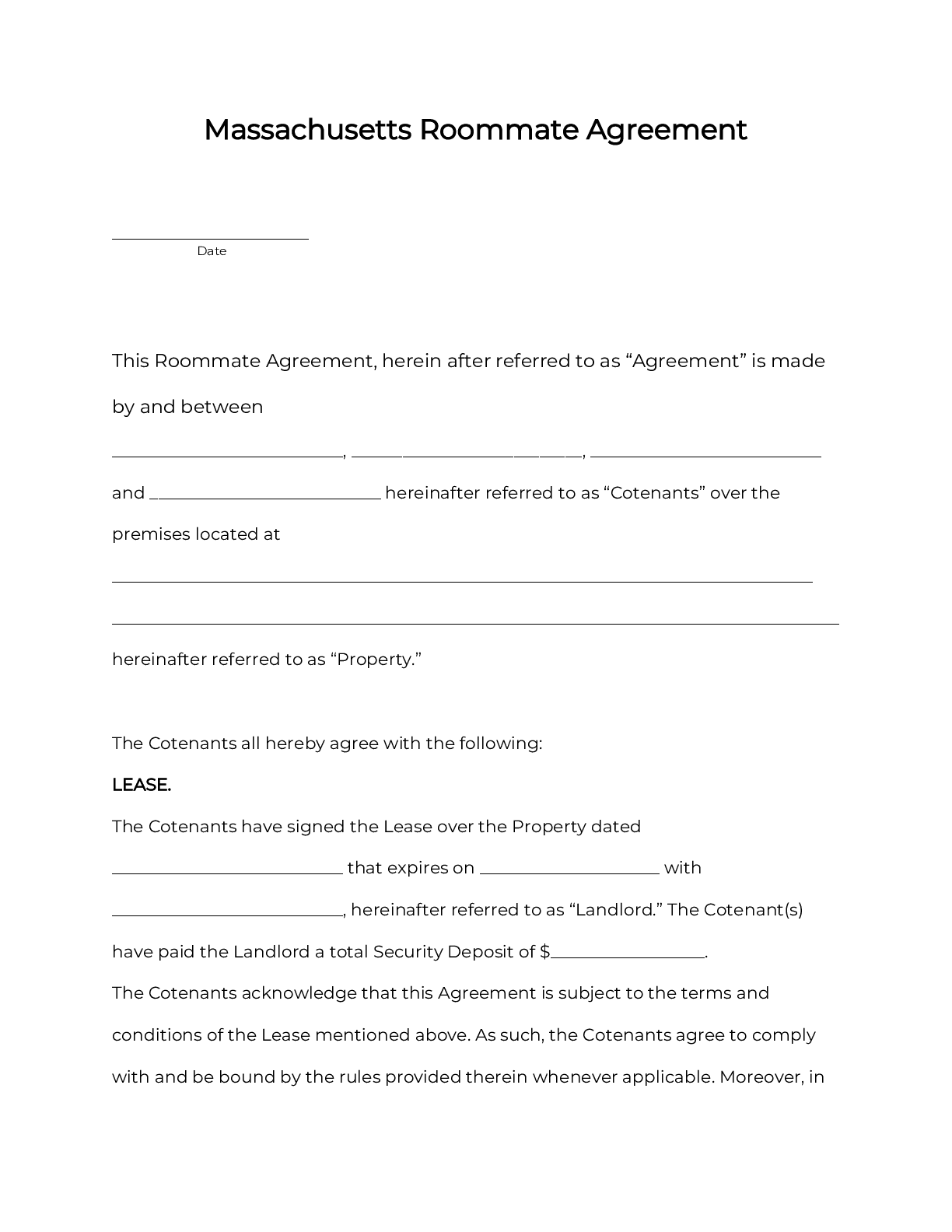
A Massachusetts roommate agreement is a legal contract between two or more people (“co-tenants”) who share a rental property according to rules they set, including for things like splitting the rent. This agreement binds the co-tenants living together, and doesn’t include the landlord.
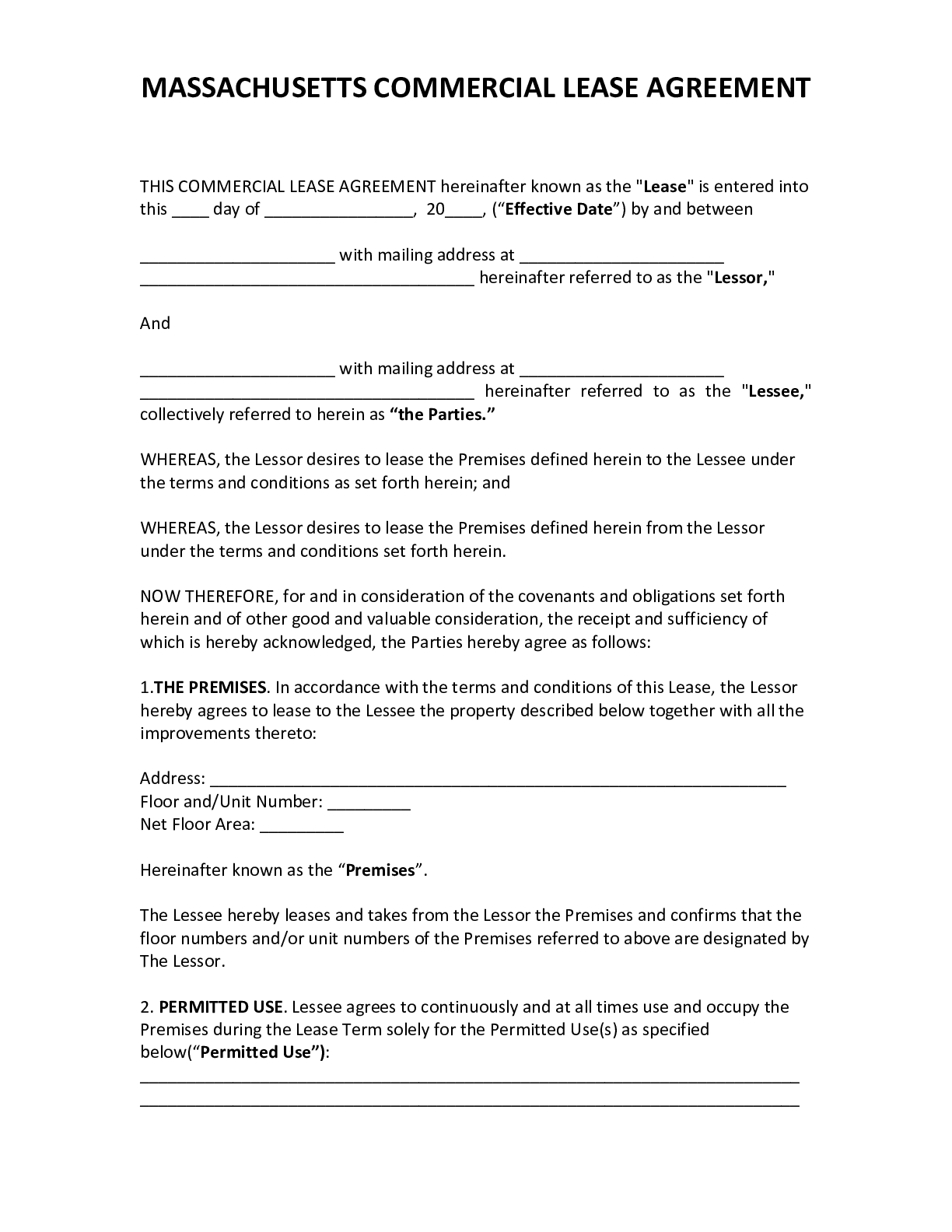
A Massachusetts commercial lease agreement is a legal contract arranging the rental of commercial space between a landlord and a business.
Massachusetts Required Residential Lease Disclosures
- Landlord’s Name and Address(required for all leases) – Massachusetts leases must contain the name and contact information of the landlord or authorized agent. This enables smooth communication of any important legal notice. Massachusetts law requires the availability of a contact telephone number. The landlord must either monitor the number every twelve hours, or provide an alternative contact for periods of temporary absence. [1]
- Notice of Occupants’ Legal Rights and Responsibilities(required for all leases) – Massachusetts landlords must provide tenants with a notice from the Department of Health discussing tenant rights and remedies related to repairs. This notice may be personally delivered, posted next to the mailboxes, or posted inside the premises. [1]
- Security Deposit Holdings(required for some leases) – Massachusetts landlords collecting a security deposit must disclose the bank and account number holding the deposit. This lets the tenant verify the funds are handled correctly.
- Security Deposit Receipt (required for some leases) – Massachusetts landlords who have collected a security deposit must provide a receipt of the security deposit. The time limit for this is after receiving the deposit, or within 10 days after the beginning of the tenancy (whichever is later).
- Move-In Checklist(required for some leases) – Massachusetts landlords must provide a move-in checklist within 10 days of move-in, outlining any existing property damage. The checklist must also have a 12-point, bold faced notice provided by statute, regarding appropriate deductions. The Massachusetts Legal Help Institute also provides move-in forms which may be useful to new tenants.
- Lead-Based Paint Disclosure(required for some leases) – For any property built before 1978, federal law requires that a Massachusetts residential lease must contain a lead-based paint disclosure with an EPA informational pamphlet, plus notice of any lead hazards on the property.
To learn more about required disclosures in Massachusetts, click here.
Some Massachusetts cities, like Boston, may require additional disclosures. Local laws may apply, not just state laws.
Massachusetts Landlord Tenant Laws
- Warranty of Habitability – Massachusetts landlords can only rent out habitable property, which means providing certain features essential to basic health and safety. This includes things like heat, plumbing, electricity, and sound structural elements. Landlords must repair any issues within a “reasonable” time (usually within 14 days) after proper notice from the tenant. Failure to repair lets a tenant sue the landlord, terminate the lease, withhold rent, or repair and deduct from the rent.
- Evictions – Massachusetts landlords may evict for rent default, lease violations, or illegal acts, among other things. Before filing eviction, landlords must serve tenants with prior notice to quit, depending on the eviction type. This means most evictions in Massachusetts take between a few weeks to a few months.
- Security Deposits – Massachusetts caps security deposits at a maximum of one month’s rent. Upon lease termination, a landlord must return any unused portion of a security deposit within 30 days.
- Lease Termination – Massachusetts tenants must terminate a month-to-month lease with 30 days of advance notice or advance notice equal to the number of days between rental payments, whichever is long. (This mostly means 31 days of notice is required for some terminations which pay rent on the same day every month.) A fixed-term lease can’t be terminated early without active military duty, landlord harassment, uninhabitable property, or domestic abuse.
- Rent Increases and Fees – Massachusetts landlords can raise rent between lease intervals by as much as they want, as often as they like, as long as they provide at least 30 days of advance notice. Late fees likewise have no maximum cap, except for bounced check fees which are capped at $30.
- Landlord Entry – Massachusetts landlords may enter rental property for purposes reasonably related to the tenancy, like maintenance and inspections. They must give “reasonable” advance notice before entering, and likewise enter at reasonable times, unless there’s an emergency.
- Settling Legal Disputes – Massachusetts allows hearing landlord-tenant disputes in its small claims courts, as long as the amount in controversy is under $7,000. The state does not allow evictions in small claims.
To learn more about landlord tenant laws in Massachusetts, click here.
Sources
(A) Every owner of a residence who does not reside therein shall post signage, which contains the owner’s name, street address and telephone number, and, if applicable:
(1) The name, street address and telephone number of the president of the corporation; (2) The name, street address and a telephone number of the managing trustee or partner if the owner is a realty trust or partnership; or (3) The name, street address and telephone number of a property manager who does not reside in the building. (B) The telephone number of the owner or property manager shall be regularly monitored, but no less than once every 12 hours, unless the owner has provided occupants with an alternative contact person and phone number for periods of temporary absence. (C) Every owner of a residence shall provide to each occupant or post in a location specified in 105 CMR 410.400(D) a copy of the Notice of Occupants’ Legal Rights and Responsibilities issued by the Department; (D) Postings required by 105 CMR 410.400 shall be on durable material not less than 20 square inches in size and placed at the residence adjacent to the mailboxes or within the interior of the residence in a location visible to the occupants.








